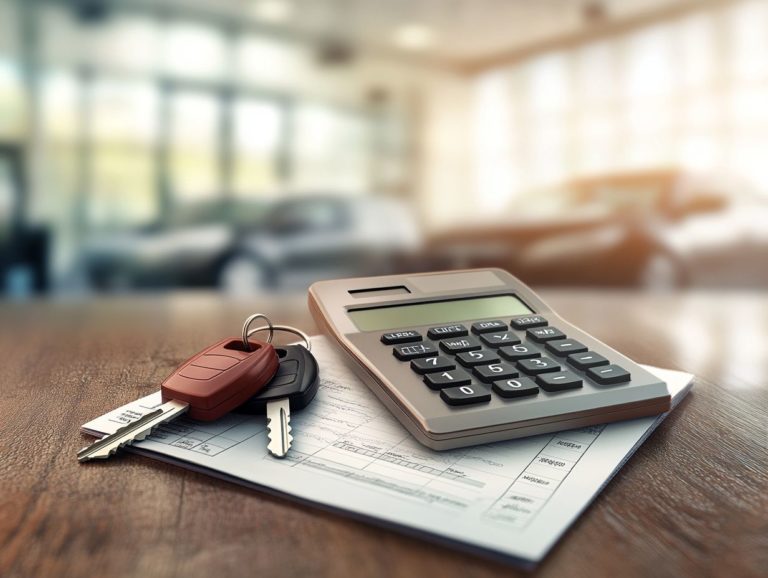The Role of Down Payments in Car Financing
When it comes to car financing, grasping the concept of down payments is crucial for making well-informed choices. This piece elucidates the definition and purpose of down payments, emphasizing their significance in securing your vehicle.
You will uncover the advantages of making a substantial down payment, such as lower interest rates, decreased monthly payments, and the opportunity to build equity in your car.
You should also consider key factors when determining your down payment, alongside practical tips for saving effectively.
Jump in to learn how to navigate the car buying process with confidence!
Contents
Key Takeaways:
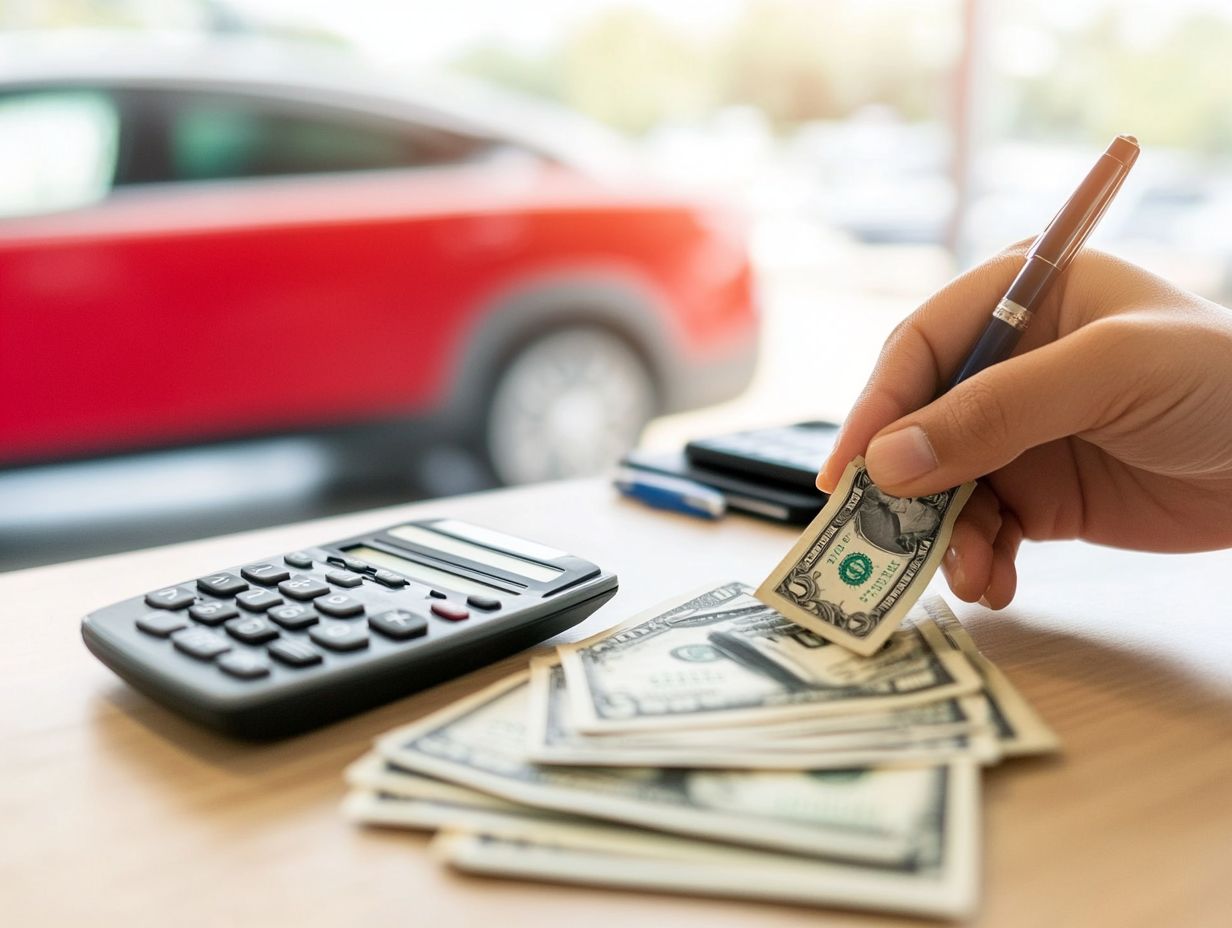
Making a down payment can lower your interest rates and monthly payments. This means you ll save money in the long run.
Your personal financial situation, loan terms, and vehicle depreciation should be considered when deciding how much to put down.
Saving for a down payment can be achieved through budgeting, cutting expenses, and exploring alternative sources of funds.
Understanding Down Payments
Grasping the nuances of down payments is essential for anyone thinking about a car purchase, as they play an important role in the money side of buying a car, affecting everything from interest rates to loan approval.
A down payment represents money upfront during the vehicle purchase process. It acts as a commitment to the lender and greatly increases your chances of loan approval.
This initial payment not only reduces the overall loan amount but also signals your seriousness in the transaction. Lenders tend to view a substantial down payment as a lower risk factor; it reflects your financial responsibility and capability, which can enhance your likelihood of securing that loan approval.
In general, the larger your down payment, the more favorable your financing terms will be think lower interest rates and reduced monthly payments.
Many lenders have specific down payment requirements, typically ranging from 10% to 20% of the vehicle’s price, depending on your credit profile and the type of financing arrangement you choose.
Benefits of Making a Down Payment
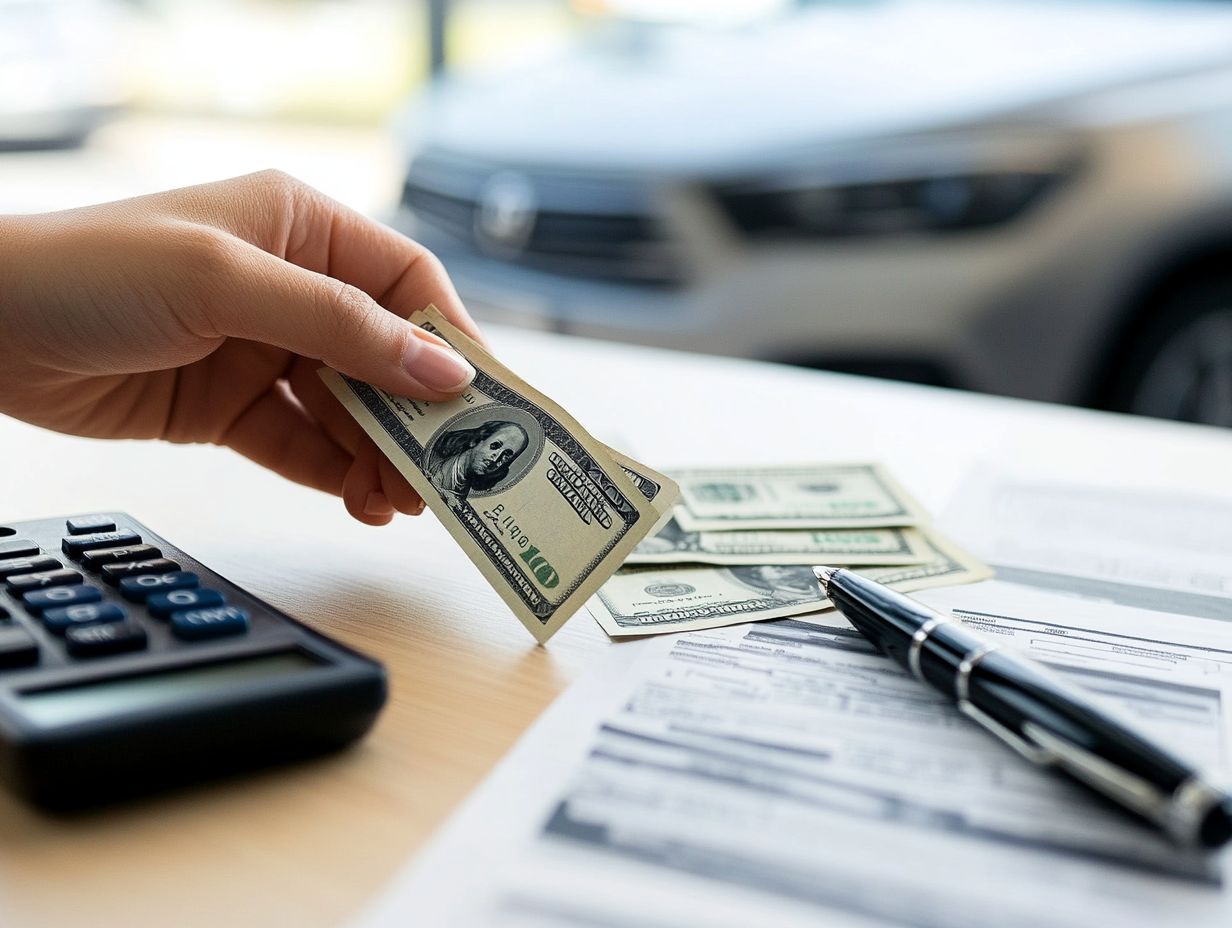
Making a down payment when purchasing a vehicle presents you with a range of significant advantages, including lower interest rates and reduced monthly payments that can greatly improve your financial standing.
By choosing to put down a larger amount, you not only minimize the total interest you ll pay over the life of the loan but also begin building equity the value you own in your car after the loan from the outset.
This strategy safeguards you against depreciation and potential financial setbacks down the line, enhancing your overall investment.
Lower Interest Rates
One of the most significant advantages of making a down payment is the opportunity for lower interest rates on your auto loan. When you present a larger upfront payment, it signals to lenders that you re financially stable and genuinely committed to the purchase.
This perception of stability reduces the risk in the eyes of financial institutions. This may lead lenders to offer you more favorable loan conditions, including those coveted lower interest rates.
Additionally, a smaller loan amount in relation to the vehicle’s cost further diminishes the overall risk for lenders, making them more inclined to offer credit on advantageous terms.
By grasping this connection between down payments and perceived risk, you can strategically position yourself for financial benefits that extend well beyond the initial purchase.
Lower Monthly Payments
Lower monthly payments present a compelling reason for you to consider making a significant down payment when financing a vehicle!
By contributing a larger sum upfront, you reduce the principal amount of your loan. This means you can enjoy smaller monthly payments, making it simpler to manage your budget.
It s crucial to align these payments with a comprehensive financial plan. Doing so ensures you stay on track with your financial obligations while minimizing the overall interest paid over time.
Ultimately, a thoughtful approach to down payments and budgeting can pave the way for greater financial stability and peace of mind as a vehicle owner.
Equity in the Car
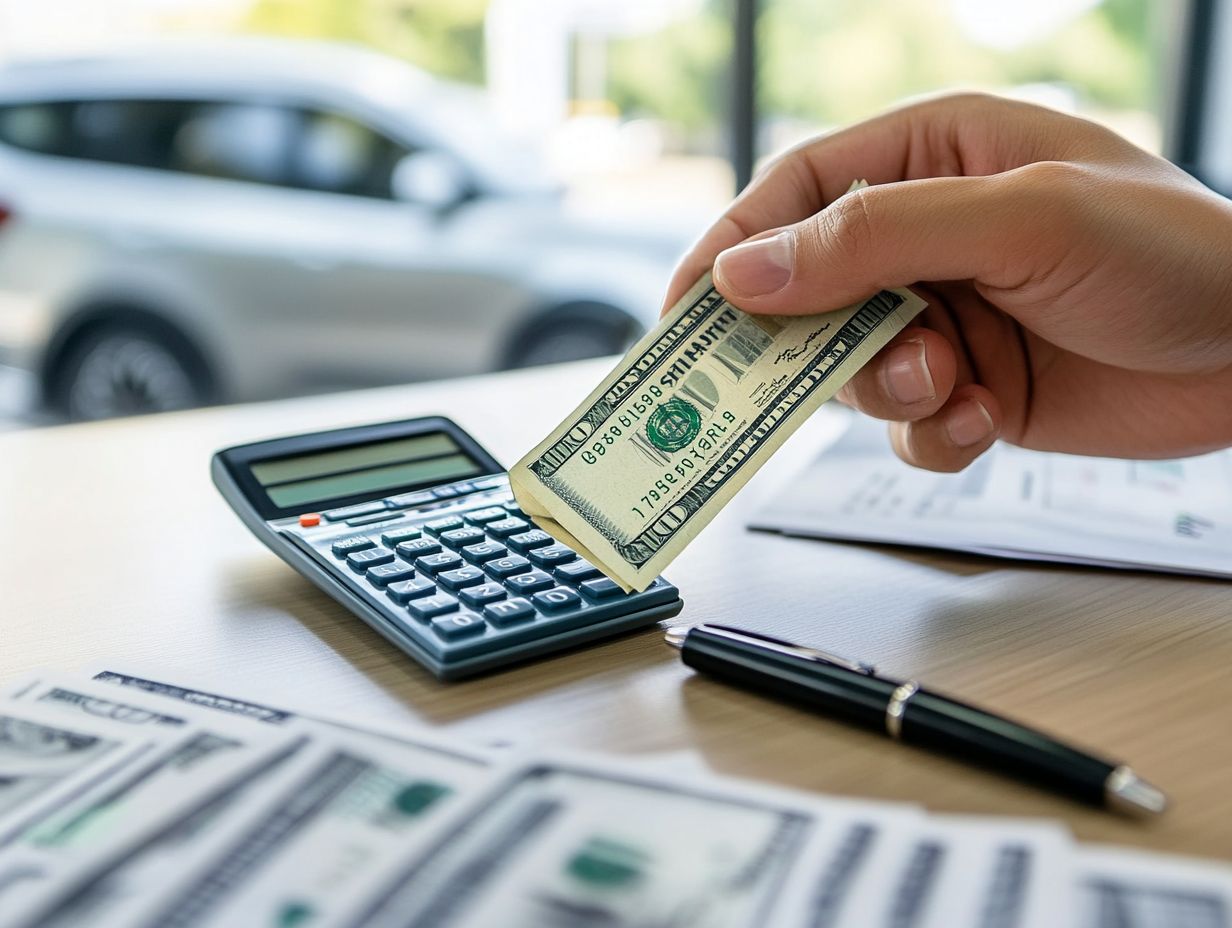
Equity in your car is a vital aspect of vehicle ownership. Making a down payment can significantly enhance that equity. This initial investment reduces the overall balance you owe, allowing you to own a larger portion of your vehicle from the start.
By contributing a substantial down payment, you lower the amount you must finance. This not only aids in your day-to-day financial management but also helps when it’s time to trade in your vehicle.
When the car’s value depreciates, having strong equity can help mitigate potential financial loss. Instead of facing a situation where your loan exceeds your car’s worth, you can enjoy a more favorable trade-in experience, making future purchases or upgrades smoother and more manageable.
Factors to Consider When Deciding on a Down Payment
When deciding on the ideal down payment for your vehicle, consider several key factors. These include your personal financial situation, specific loan terms, and current interest rates.
Each of these elements shapes your overall financing strategy and can greatly influence both your monthly payments and long-term financial goals.
Personal Financial Situation
Your personal financial situation is crucial when determining the appropriate size of your down payment. Several interconnected factors come into play.
Your income level serves as the foundation for understanding your overall financial capacity, while your monthly expenses clarify how much is genuinely available after accounting for essential outflows.
A solid savings plan can boost your ability to make a larger down payment, reducing the need for private mortgage insurance in the future. However, any existing debts should be considered carefully, as they can constrain your cash flow and limit your potential contributions.
Ultimately, aligning this payment with a realistic budget ensures not just homeownership but also your sustained financial well-being.
Loan Terms and Interest Rates
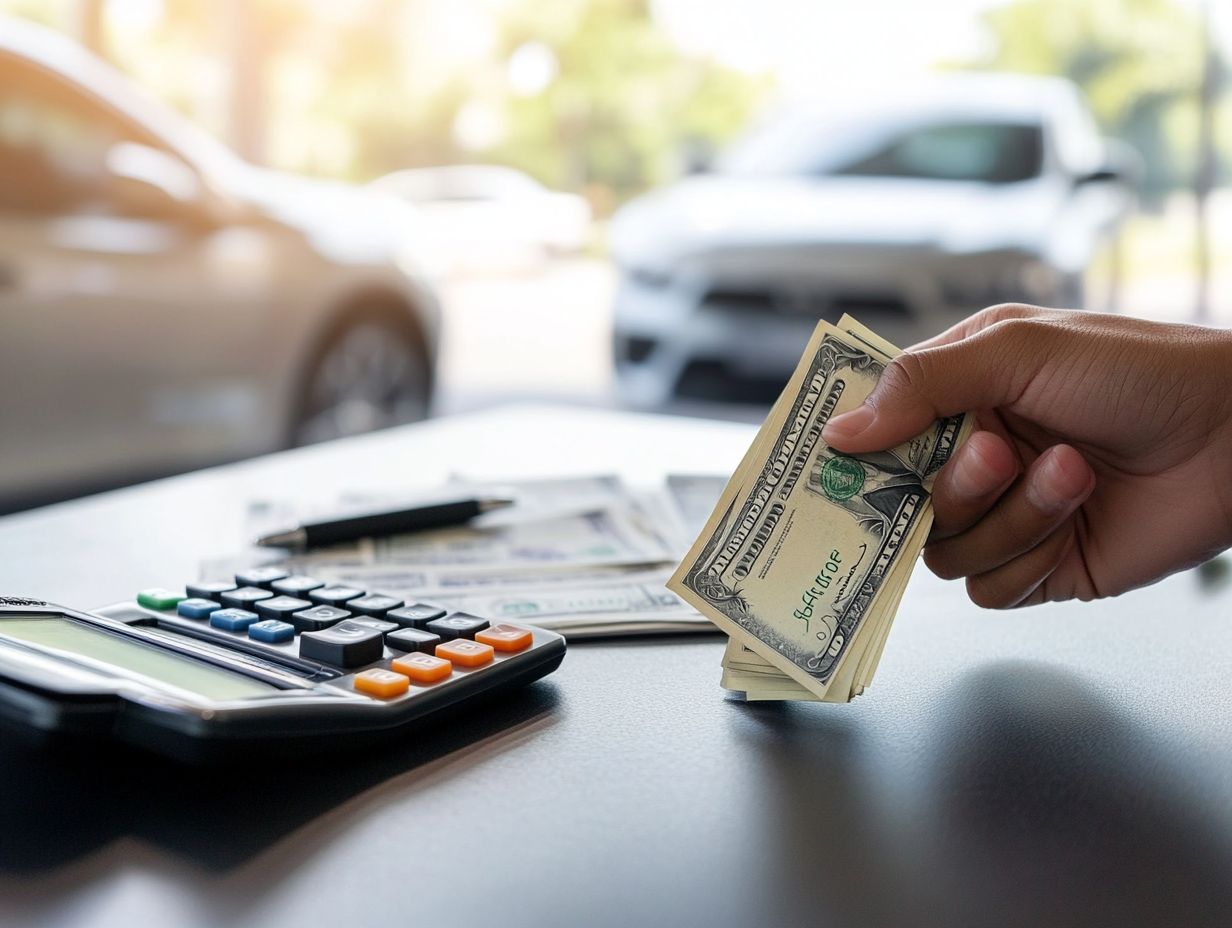
The terms of your loan and the interest rates you encounter are greatly influenced by the size of your down payment. A larger down payment typically results in a lower ratio of your loan amount to the car’s value, which lenders use to evaluate risk.
By contributing more upfront, you demonstrate financial stability and reduce the total amount you need to borrow. A lower ratio often translates to more favorable loan conditions, including reduced interest rates, as lenders see you as a lower-risk borrower!
On the flip side, a smaller down payment can lead to a higher ratio, making your borrowing experience more expensive in terms of interest. In such cases, lenders may impose higher rates to protect themselves from potential losses.
Consider evaluating your financing options or consulting with a financial advisor for personalized advice.
Vehicle Depreciation
Vehicle depreciation is an important aspect for you to contemplate when determining your down payment amount.
Grasping the rate at which a vehicle loses value can significantly affect your overall equity. As your vehicle ages, its market value diminishes, which can introduce potential financial risks.
By opting for a larger down payment, you can lower the amount financed, which not only reduces your monthly payments but also offers a buffer against swift depreciation. This approach proves particularly beneficial if you encounter unexpected financial challenges or if your vehicle is totaled, as it decreases the chances of owing more than the vehicle’s worth.
In the end, prudent financial planning regarding depreciation and down payments is your key to protecting your equity and securing a brighter financial future!
How to Save for a Down Payment
Saving for a down payment is an important step in enhancing your financial standing and reaching your objective of purchasing a vehicle.
By employing effective strategies, you can accumulate the necessary funds with remarkable efficiency.
Budgeting and Cutting Expenses
Budgeting and spending less are powerful strategies to help you save for a down payment on your vehicle.
By mastering a variety of budgeting techniques, you can streamline your spending and pinpoint areas where you can set aside more funds each month. Approaches like the envelope system, which involves using cash for specific spending categories, and zero-based budgeting, which means allocating every dollar you earn to expenses, savings, or debt payments, can provide you with a clearer picture of your financial landscape.
Embracing frugal habits such as cooking at home instead of dining out, negotiating your bills, or canceling subscriptions you no longer use can significantly lower your monthly expenses.
Adopting these practices doesn t just improve your financial discipline; it also speeds up your journey toward that all-important down payment, paving the way for a brighter, more prosperous future!
Alternative Sources of Funds
Exploring alternative sources of funds can be a game-changer in your journey to save for a down payment. You might not realize that personal loans can actually serve as a solid option to supplement your savings.
By acquiring a modest personal loan, you could effectively boost your available funds, making it easier to reach that down payment goal faster than you thought possible. Gifts from family members can also play a pivotal role, providing direct support that lightens your financial load.
Leveraging a trade-in vehicle can substantially improve your overall financial picture, allowing you to enhance your down payment with the equity gained from the trade-in.
Each of these strategies can pave the way for a more favorable outcome in securing your dream home, ensuring that homeownership remains well within your grasp. Start exploring these options today to make vehicle ownership a reality!




